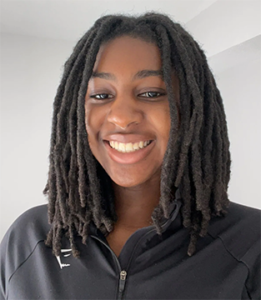
After not being able to find a local salon that could care for her hair, Adanna Amechi decided to take matters into her own hands.
After three salons told her they couldn’t provide the style she was looking for Amechi was inspired to start The President Braids to improve hair care options for people of colour in Ontario who may have curly or coily hair, also known as Type 3 or Type 4 hair.
“Back home we have hair salons everywhere so we never really had to bother too much,” said Amechi, who is studying chemical engineering at the University of Waterloo.
So she pored through video tutorials and reached out to friends and family back home in Nigeria to teach herself how to braid and care for her hair. She spent weeks practising on herself, and it wasn’t long before she started helping friends.
“I realized it wasn’t just a me problem,” she said. “Next thing I knew it was friends’ friends and friends of other friends and it became a word-of-mouth thing.”
The President Braids is a virtual training space to teach people different techniques and styles for curly or coily hair. It hopes to train enough stylists to bridge a gap in services in cities across Ontario.

“I did a little research and I found that only one per cent of the hair salons in the province of Ontario actually accommodate Type 3 or 4 hair, which is alarming considering that people with Type 3 or 4 hair make 23 per cent of the population,” she said.
Pamela Onyemenam, a student at Carleton University in Ottawa, partnered with Amechi to get the business off the ground.
It’s not uncommon for people to travel from the region to the Greater Toronto Area, to get their hair done, Amechi said. Onyemenam adds that finding an affordable salon can also be a challenge for many people.
“We try to stay affordable so that other Black women with our type of hair can have an opportunity to braid their hair,” Onyemenam said. “There’s not a lot of people who can braid our type of hair and we decided to be the people that we couldn’t see.”
The founders of Fabbulists also notes the lack of services and say they are doing what they can to bridge a gap in the region and beyond. Their platform acts as a market place that pair stylists with people looking to get their hair or makeup done.
“We’re serving a market that has overlooked people,” said Manny Ojigbo, who founded Fabbulists with his wife Elizabeth Azuya in 2019.
“We want to be able to help get the stylists the visibility they deserve and want to be able to show that it’s ok to have a different type of look. This kind of hair is good hair as well because there is still that stigma,” he said.
With almost 300 people who have reached out looking for services this year, Amechi and Onyemenamand say they want to focus in recruiting more people who want to learn these techniques.
“We’re open to anyone who is willing to learn, even people who are beginners,” Amechi said.
“We’re really trying to expand as much as possible because we now know that there are so many people that we could be able to help.”


